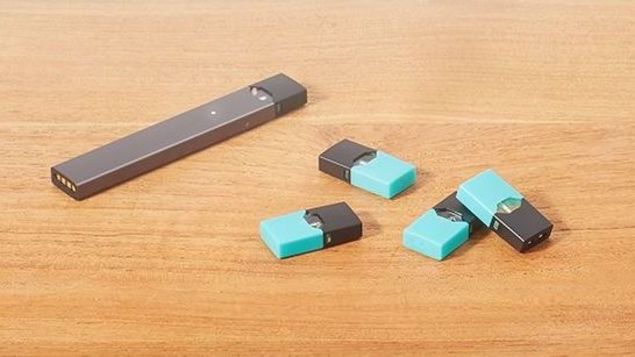One of the biggest topics right now in high school parent newsletters everywhere is the Juul. It’s a popular e-cigarette system that looks a lot like a USB flash drive—you may have seen one in your teenager’s room, figuring it contains an essay on The Great Gatsby. Based on Twitter and Instagram posts with the hashtag #doit4juul, students are “juuling” wherever, whenever—in school bathrooms, in libraries and under their desks in class. They’re getting away with it because the device is discreet, the “cloud” can be hidden in a sleeve, and the vapor smells sweet and fruity, unlike cigarette smoke. Among teens, e-cigarettes are more popular than traditional cigarettes, and the Juul brand is currently king.
School administrators are trying to crack down on juuling. One Miami counselor confiscates two Juuls per week. A district in Pennsylvania has banned actual flash drives on campuses in an attempt to get rid of the confusion. A principal in D.C. felt the Juul problem was becoming so bad that he took doors off the bathroom stalls.
Here is what parents need to know about the e-cig of the moment:
What Does It Look Like?

The Juul consists of a long, slim vaporizer and disposable “pods” of nicotine juice. The pods come in flavors such as mango, creme brulee and cucumber. Some call the Juul the “iPhone of vapes” because of its sleek and minimalistic design. It charges on a laptop or other USB port.
How Does It Work?
The device heats the nicotine juice to create vapor, which is inhaled by the user.
Who Is It Intended For?
Juul describes itself as “a mission-driven company seeking to eliminate cigarettes by providing a true alternative for adult smokers.” The company states on its website that Juul is “not appropriate or intended for youth, former smokers, or never smokers.” To purchase Juul products on the official website, JUULvapor.com, you must be 21 and go through an age verification process. In stores, you must be of the legal age to buy a tobacco or nicotine product in your state. But teens are finding ways to get them, such as using fake IDs, buying them on unregulated websites or knowing of a lax gas station attendant.
What Does It Feel Like to Juul?
One anonymous 15-year-old describes it like this:
The first time was in the lunchroom. Everyone else was hitting it and I was like “alright, I want to try that.” I guess I knew there was nicotine in it, but I had no idea that it had so much. When I hit it for the first time it was, like, really crazy. I felt a really big buzz off of barely anything.
It hurt my throat more than anything else I’ve done. I hit it and coughed immediately. At first it was just fun and it was something that you could do anywhere. It’s so easy. Then it just became something I was doing nonstop, but I still felt a buzz. Now, I go crazy if I don’t have it. I don’t even feel a buzz anymore.
Jack Waxman, a high school senior in New York who’s working to spread awareness about the dangers of teenage Juul usage, says he’s seen friends all go down the same path: First, they’re attracted by the “fun flavors” and enticed by the head-rush. But then, after using the Juul for a while, they feel no rush at all. “They use the device to make their body feel normal again, just like any smoker,” Waxman says. He’s seen people “struggle to make it thirty minutes without taking a hit.”
How Much Nicotine Does It Contain?
Each pod has about the same amount of nicotine as a pack of cigarettes, or 200 puffs. Specifically, the nicotine concentration is 59 mg/mL per pod, which can be more than double that of other vaping products. It gives users a strong, fast punch.
How Dangerous Is the Juul for Those Underage?
For adults, vaping is generally believed to be a healthier alternative to cigarettes because it doesn’t burn tobacco and release carcinogens. (Under FDA regulations, Juul “cannot and does not make any claims that its products are less harmful or safer than cigarettes.”)
But no e-cigarette product should ever be considered “safe,” especially not for those underage. Teenage brains are still developing, so they’re uniquely vulnerable to addiction. Nicotine is very addictive, and exposure to nicotine in adolescence has been shown to have long-term impacts on brain development. It may affect teens’ behavior, concentration, memory and their ability to learn.
There are other health concerns for young people who vape. According to a study published in the American Journal of Respiratory and Critical Care, adolescents who use e-cigarettes are twice as likely to suffer respiratory symptoms such as a persistent cough, bronchitis, congestion and phlegm as those who don’t. And there’s some evidence that shows teen vapers are more likely to take up smoking tobacco cigarettes than non-vapers.
Also, a lot of teenagers have no idea what’s in their vape. In a study sponsored by the National Institute on Drug Abuse, when high schoolers were asked what they believed was in the last product they vaped, most said “just flavoring.” As for the Juul, some teens are filling the pods with other substances, which is even more dangerous.
How Can You Tell if Your Teen Is Juuling?
Signs of general e-cigarette use include increased thirst (the propylene glycol in the devices can cause dry mouth), a new sensitivity to caffeine and possible nosebleeds.
It’s important to start a conversation with your teens about e-cigarettes, whether you suspect they are using them on not. With the Juul, you might open with a general, nonthreatening question—“Hey, I just read about this thing. What have you heard about it?”—and see what they say. Explain the serious health risks of e-cigarettes (remember phlegm, nosebleeds, lung problems, a messed-up brain, and addiction, just to name a handful). If your son or daughter is vaping, let them know that you do not approve, and work with them to replace the unhealthy behavior with a positive one. E-cigarettes contain more than fun, fruity flavors, and when teenagers use them, there may be lasting consequences.








